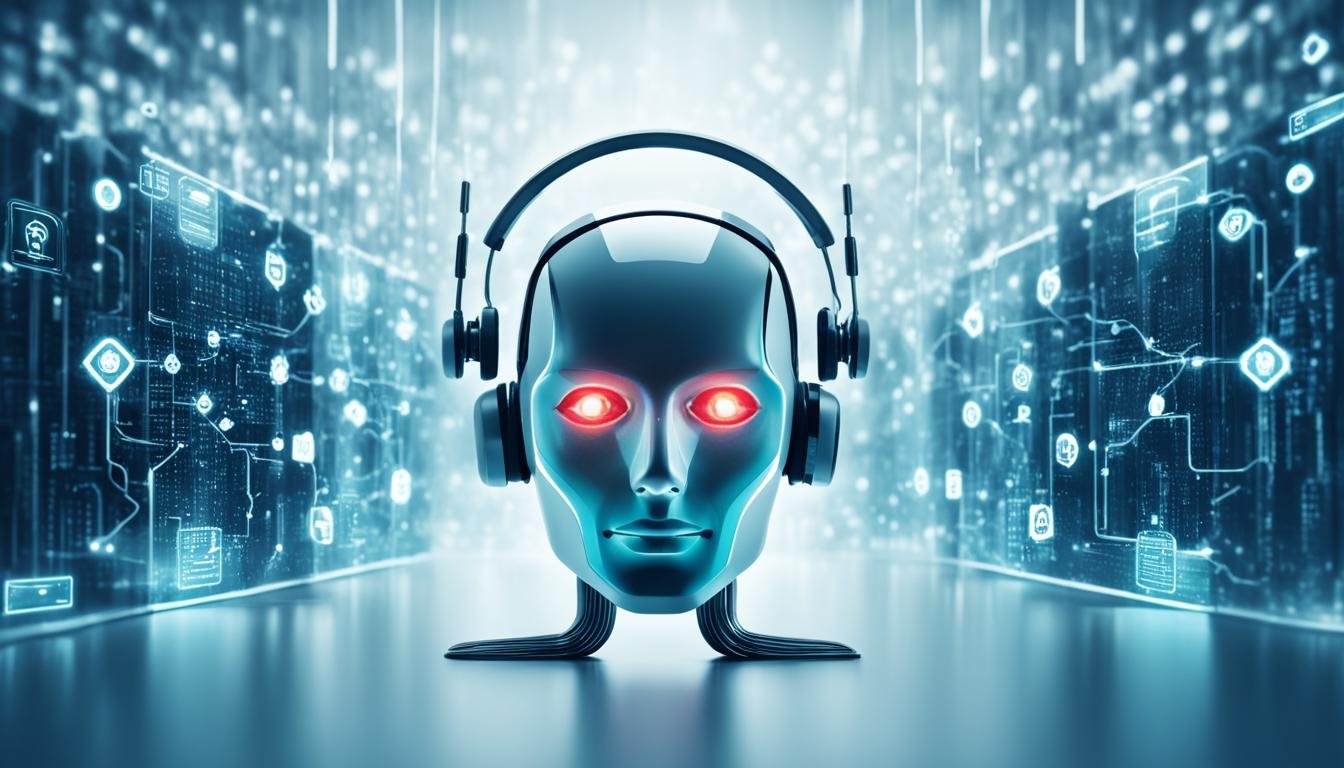Eleven percent of data workers share confidential info with ChatGPT, says Cyberhaven. Also, 4% have shared sensitive data with ChatGPT at least once. This raises big worries about AI app safety. As companies use AI more to get things done faster, we need to look at the risks. We must make sure to protect sensitive info and keep user privacy safe.
Key Takeaways
- AI apps can be vulnerable to data breaches, privacy risks, and software vulnerabilities
- Evaluating app providers and their security practices is essential for ensuring AI app safety
- Providing user training and awareness is crucial to mitigate the risks associated with AI app usage
- Implementing multi-layered security protection, including cybersecurity measures, can help safeguard AI apps
- Exercising caution and prioritizing data protection when using AI chatbots and other AI-powered tools is vital
Introduction to AI Apps
The rise of artificial intelligence (AI) in business has brought many benefits. AI-powered apps can save time by transcribing meetings and organizing data. They also create summaries, helping employees work more efficiently.
Chatbots can answer customer questions all day, every day. This reduces wait times and enhances customer service with AI. Many AI apps offer affordable plans, making them a smart choice over traditional software or hiring more staff.
The Rise of Artificial Intelligence in Business
Businesses from all over are quickly adopting AI in business. They see the value in streamlining workflows with AI and boosting productivity. AI apps automate tasks and offer personalized advice, becoming key tools in today’s work.
Benefits of AI Apps for Businesses
- Increased efficiency and productivity through task automation
- Improved data analysis and decision-making
- Productivity boost with AI apps by freeing up employee time
- Enhanced customer experience with 24/7 AI support
- Cost savings compared to traditional software or hiring more staff
The ai apps in business world is always changing. Companies are using AI to get ahead and innovate.
“AI-powered apps are changing how we work. They make processes smoother and boost efficiency and productivity.”
| Types of AI Technologies in Mobile App Development | Benefits |
|---|---|
| Machine Learning (ML) | Provides personalized recommendations, understands user intent, and prevents fraud |
| Natural Language Processing (NLP) | Enables voice commands, text translation, and sentiment analysis |
| Computer Vision | Creates engaging user experiences, improves image recognition, and detects objects |
| Virtual Assistants and Chatbots | Improves customer satisfaction, cuts costs, and optimizes resources |
| Predictive Analytics | Helps make better decisions and increase revenue |
Safety and Security Concerns with AI Apps
AI-powered apps are becoming more popular, but they bring safety and security worries. Data breaches and privacy risks are big threats. These apps often deal with sensitive user data. Software vulnerabilities and risks from third parties can make these apps open to cyber attacks. This could lead to financial losses and harm a company’s reputation.
Data Breaches and Privacy Risks
Data breaches are a big worry for AI apps. They are often targeted by cybercriminals. AI apps handle a lot of customer data, like personal info, financial details, and private messages. If this data gets to the wrong people, it could be used for identity theft or financial fraud. AI app data breaches can really hurt businesses and their customers.
Privacy issues also come up with AI apps because they collect and process a lot of user data. It’s not always clear if these apps follow data privacy laws, like the GDPR or CCPA. AI privacy concerns are big because users might not know how their data is being used and shared.
Vulnerabilities and Third-Party Risks
AI apps can have software vulnerabilities that hackers can use to get into the system or cause trouble. AI app vulnerabilities can be in the code, how it works with other services, or its settings. If these issues aren’t fixed, hackers could break in and cause big problems.
Also, third-party risks with AI apps come when companies work with outside vendors for AI tech. If these partners don’t have good security, they can be a way for cyber attacks to get in. This could put the whole system at risk.

“AI apps can be vulnerable targets for data breaches, which can inflict financial losses and reputational damage on companies.”
As AI apps grow, it’s important for businesses and users to stay alert and focus on keeping these technologies safe. By tackling these issues, we can make the most of AI while keeping data safe.
Ensuring AI App Security
As AI apps become more popular, businesses must focus on keeping them safe. This means checking the security of AI app providers and training users well. It’s a two-step plan to stay ahead of risks.
Evaluate App Providers and Their Security Practices
When picking AI apps, businesses should check the security steps taken by the providers. Look for providers known for protecting data well, using strong encryption, and being open about how they handle data. This careful check can prevent data breaches and risks from using third-party AI apps.
Provide User Training and Awareness
Businesses should also train their users on how to safely use AI apps. Teach them about the good and bad sides of AI apps and how to use them right. This way, employees can use AI apps safely, reducing the chance of security issues and promoting smart AI app use.
| Key Tactics for Ensuring AI App Security | Description |
|---|---|
| Evaluate App Providers | Check the security steps and data protection of AI app providers before using their solutions. |
| Provide User Training | Teach employees how to use AI apps safely, including risks and best ways to use them. |
| Implement Access Controls | Set strong access controls and rules to keep unauthorized people from accessing important data and features. |
| Continuous Monitoring | Keep an eye on how AI apps are used and their security to spot and fix threats or weaknesses fast. |
By being proactive and covering all angles, businesses can lower the risks of AI apps and use their benefits safely.
AI-Driven Social Engineering and Cyber Threats
AI apps have brought new social engineering and cyber threats. Cybercriminals use AI to make fake online profiles and send many messages a day. They try to get people to connect and share private info. This is called ai-driven social engineering and could get worse as AI gets better.
Recent data shows how AI is changing the cyber threat scene. Experts see more ai-powered cyber threats, like automated malware and AI-made phishing attacks. These threats can look very real and personal, making them hard to spot.
Using AI in cyber security has both good and bad sides. It can help fight threats faster, but it also brings risks. AI and social media security risks include AI-made deepfakes and the misuse of AI chatbots.
“The rise of AI-driven social engineering attacks highlights the critical need for businesses and individuals to remain vigilant and discerning when receiving requests or messages from unfamiliar sources.”
To fight ai-driven social engineering attacks and ai-powered cyber threats, we need a strong security plan. This means using both human skills and AI tools. It’s important to have strong checks, protect access, and use encryption. Also, teaching people about online safety is key.

As AI gets better, we must keep up with the latest AI and social media security risks. Knowing these risks helps protect businesses and their customers from AI threats.
Multi-Layered Security Protection
AI apps are becoming more common in business. Protecting them from cyber threats is crucial. To keep AI apps safe, a multi-layered security plan is needed. This plan uses various cybersecurity steps to guard against threats.
Cybersecurity Measures for AI App Safety
Protecting AI apps means using different levels of security. This includes:
- Anti-spam filters to stop bad content
- Advanced firewalls to watch and control traffic
- Endpoint detection services to spot and act on suspicious actions
- Remote monitoring and IP traffic analysis to find and stop threats
- SIEM and SOC tools to quickly handle security issues
With these multi-layered cybersecurity measures for AI apps, companies can tackle the challenges of AI tools. This ensures the comprehensive security and safety of their AI applications.
| Cybersecurity Measure | Benefit |
|---|---|
| Anti-spam filters | Prevent the infiltration of malicious content |
| Advanced firewalls | Monitor and control network traffic |
| Endpoint detection services | Identify and respond to suspicious activities |
| Remote monitoring and IP traffic analysis | Detect and mitigate potential threats |
| SIEM and SOC tools | Quickly identify, analyze, and address security incidents |
Using these multi-layered cybersecurity measures for AI apps, companies can shield their AI apps from threats. This ensures the comprehensive security and safety of their AI-powered tools and technologies.
are ai apps safe
The world of technology is changing fast, and AI apps are becoming more common. They help make things more efficient and save money for businesses. But, there are worries about their safety and security. Experts say AI apps have big benefits but also bring risks that need attention.
One big worry is data breaches and privacy issues. AI apps need to know a lot about you, like your personal info and where you are. Scammers make fake AI chatbot apps to get this info or make you pay for things you don’t want.
- Check reviews for security issues before downloading AI apps.
- Be cautious with granting permissions to AI apps on your device.
- Regularly update your AI apps to fix security vulnerabilities.
- Use strong passwords or codes to enhance the security of your AI apps.
There’s also a risk of software bugs in AI apps. These can be used by hackers to get into systems and cause trouble. Even apps like OpenAI’s ChatGPT, which are meant to help, can be seen as threats by security agencies.
“Scammers have been creating fake AI chatbot apps and flooding app stores with them in the hopes of deceiving people into purchasing subscriptions that can cost as high as $69.99 per month.”
To keep AI apps safe, we need a strong plan. This means checking who makes the apps and how they keep data safe, teaching users about risks, and using strong security steps. Companies like Microsoft and Google are making safer AI apps that care about your privacy and security.
In the end, making AI apps safe is a big task. These tools are very useful but come with risks. By being careful and knowing how to stay safe, we can use AI apps without the dangers. Staying informed and using good practices helps us enjoy AI’s benefits safely.
Using AI Apps with Families
AI tools like ChatGPT can be used in fun ways with families. Instead of just learning facts, families can use it to write stories, make poetry, or talk about moral questions. Parents and kids can make up fairytales or songs together, boosting creativity and thinking skills. But, it’s important to check the info ChatGPT gives out. This tool can be great for learning and fun if used right.
Creative Applications of ChatGPT for Families
Families can use ChatGPT to be creative together. Here are some ideas for using this AI tool with your family:
- Collaborative Storytelling: Parents and kids can make up stories together, adding to the plot and characters.
- Poetry Crafting: Encourage kids to try out different types of poetry, like haikus or limericks, and improve their poems with ChatGPT.
- Moral Dilemma Discussions: Talk about tough situations with ChatGPT and discuss what’s right and wrong, teaching critical thinking and empathy.
- Song Composition: Have your kids write song lyrics, then use ChatGPT to find melodies and harmonies, helping them be more musical.
By using family-friendly AI tools, parents can help their kids be more imaginative, solve problems, and enjoy the arts.
“AI can be a powerful tool for families, but it requires responsible and thoughtful use. By focusing on creative applications and ethical considerations, parents can unlock the benefits of using AI apps with families while mitigating potential risks.”
When using creative ChatGPT for families, talk openly, check facts, and keep your kids safe. With care, family-friendly AI tools can add a lot to your family’s fun and learning.
The Role of AI in Keeping Minors Safe Online
Artificial intelligence (AI) is becoming a key tool to protect kids online. Explainable AI helps make social media algorithms clear, so parents can see and block bad content. AI also helps in filtering out harmful stuff, keeping kids safe from the dangers of the internet.
Explainable AI for Content Moderation
Social media has made it hard to keep kids safe online. AI algorithms can show kids things they shouldn’t see. But with explainable AI, these systems can be more open. This lets parents see what’s happening and block bad content.
This way, families can make better choices and keep their kids safe online.
AI-Powered Parental Controls
AI-powered tools add another level of safety for kids. They watch what kids do online, block bad stuff, and tell parents about risks. AI is not the only answer, but it helps a lot in keeping kids safe online. As the internet changes, AI can help parents feel more in control.
“AI is not a silver bullet, but it can be a powerful ally in protecting children from the risks of the digital world. By harnessing the capabilities of explainable AI and advanced parental controls, we can create a safer online environment for the next generation.”

Working together, we’re making AI a big part of keeping kids safe online. These technologies make the internet safer for young people. They let kids explore the web with more confidence and safety.
AI as an Ally for Online Safety
The digital world is always changing, bringing up new worries about AI app safety. But, AI can be a big help in making the internet safe, especially for kids. New AI tools like explainable AI and advanced content moderation can work with humans to lower online risks.
AI is helping to make things safer by aiming to cut down serious injuries and deaths by 50% in the next ten years. Safety experts are now looking at 155,000 observations a year thanks to AI. Companies using AI have seen fewer injuries, staying below average rates in just two years.
AI has changed how safety talks happen in companies, going from 12,000 to 155,000 talks a year. This change means better sharing of ideas and a safer work place.
As we deal with the digital world’s challenges, AI could be a big help in keeping us safe online. AI-powered home security systems are becoming popular, offering things like face recognition and alerts. These systems make homes safer and work well with smart devices, giving families a better way to protect themselves.
But, using AI for security has its problems. False alarms, cost, and privacy concerns need to be fixed for these systems to work right. Still, AI’s power to change how we think about online safety is clear. As we move forward, AI could be key to a safer internet for everyone.
| Statistic | Value |
|---|---|
| Percentage of people surveyed expressing more excitement than concern about AI | 10% |
| Percentage of respondents feeling a mix of excitement and concern towards AI | 36% |
| Percentage of Americans revealing greater concern than excitement regarding AI | 52% |
| McAfee’s weekly AI-driven threat detections | 1.5 million |
| McAfee’s hourly detection of malicious threats | 8,928 |
| McAfee’s daily detection of phishing attempts | Over 1 million |
| Percentage reduction in background processes by McAfee’s Next-gen Threat Protection | 75% |
| Times faster scanning by McAfee’s Next-gen Threat Protection compared to before | 3x |
“The utilization of AI apps in safety processes potentially aims to reduce severe injuries and fatalities by 50% over the next decade.”
Using AI in safety has shown good results, like fewer injuries and more safety talks. As AI gets better, it will play a big part in keeping us safe online, especially kids.
Embracing AI Apps Responsibly
Using AI apps brings both good and bad sides for businesses and people. The good parts include more work done, automation, and saving money. But, we must look at the safety and security issues with these apps. By being careful and focusing on keeping data safe, training users, and strong cybersecurity, we can use AI safely and ethically.
As AI changes, it’s important to keep a balanced view. We should think about the ethical considerations for AI app adoption and the benefits and risks of AI apps. Everyone should use AI apps wisely, making sure they fit with their goals and values.
Prioritizing Data Protection and Cybersecurity
Keeping AI apps safe is key. Companies need to check the security of their AI app providers. They should make sure there are strong steps to protect user data. Teaching users about AI apps and their risks can help them make smart choices.
Navigating the AI Landscape Thoughtfully
The AI world is always changing, so we must be careful. We need to keep up with new things, think about the ethical considerations for AI app adoption, and deal with any new issues. By being careful and responsible, we can use AI’s benefits while avoiding risks and keeping our digital world safe.
“Embracing AI responsibly means striking a balance between the benefits and the risks, and prioritizing data protection and cybersecurity at every step of the way.”
In the end, using AI apps wisely needs a careful and thoughtful approach. By focusing on keeping data safe, having strong cybersecurity, and understanding the benefits and risks of AI apps, we can use these powerful tools safely. This way, we keep our digital world safe and ethical.
Conclusion
AI apps are changing how we work and live, bringing both good and bad sides. They can make us more productive, improve customer service, and save money. But, they also bring big safety and security worries.
Businesses and people need to be careful with AI apps. They should focus on keeping data safe, training users, and having strong cybersecurity. This helps prevent data breaches, privacy issues, and new cyber threats.
As AI gets more advanced, we must use it wisely and keep it safe for everyone. We need strong laws, to fix AI biases, and protect against AI misuse and surveillance. The future of AI safety will need a mix of benefits and safeguards for everyone.
We must be proactive and careful with AI apps. By staying updated, following best practices, and pushing for responsible AI, we can use AI safely. This way, we can enjoy AI’s benefits while keeping our digital world secure for everyone.
FAQ
What are the key safety and security concerns with AI apps?
AI apps face risks like data breaches and privacy issues. They can also be hit by cyberattacks, causing financial and reputational harm to businesses.
How can businesses ensure the security of their AI apps?
Companies should check the security of AI app providers. They should also train users and use strong cybersecurity tools. This includes anti-spam filters and security monitoring.
What is the risk of AI-driven social engineering attacks?
Hackers use AI to make fake online profiles and send many messages. This is called AI-driven social engineering. It’s a big worry as AI gets better. People and businesses must be careful with unknown messages.
How can AI be used to enhance online safety for minors?
AI can help make social media safer for kids. Tools like explainable AI and parental controls can filter out harmful content. They help protect kids from online dangers.
Can AI apps be used in a family-friendly way?
Yes, AI tools like ChatGPT can be fun and educational for families. Parents can use them to write stories or explore moral questions. But, they should be careful and check the info given.
